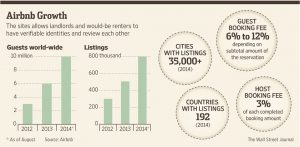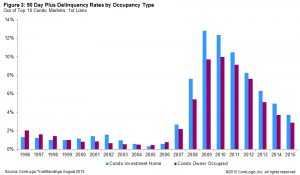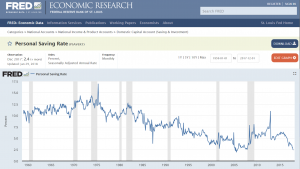Like many of you I had a “rocky” ride in the last real estate recession and successfully learned many “million-dollar” lessons that were very painful. One of the key takeaways from the last recession is that risks lurk in plain sight. Hindsight 20-20 it was easy to see the mortgage meltdown approaching. What is the risk today that is hiding under your nose that will get triggered in the next recession?
What is the risk in the next cycle that is “hiding” in plain sight that nobody seems to be talking about? Short term vacation rentals like Vrbo, Airbnb, etc…. These short-term rentals are growing rapidly. Here are a few statistics from Colorado that shows the huge growth from 2009-14. Also look at the chart below from Airbnb (source WSJ)
- Vail 144% increase
- Steamboat Springs 175% increase
- Breckenridge 114% increase

Why rent short term vs. long term? Basic economics! A short-term rental can gross three to 4 times the amount of a long-term rental property. Many property owners in resort communities have discovered the new economics of short term rentals and have jumped on the bandwagon as you can see above.
Why short-term rentals are riskier? Short-term rentals are much more prone to economic shock from cycles than longer term rentals. If we look at the last recession (and prior recessions) the first thing cut back by consumers is vacations. We see that people will vacation locally as opposed to venturing to faraway places. Local visitors spend substantially less than destination spenders.
Short term rentals more prone to shock. Short-term vacation rentals/nightly rentals are much more exposed to changing consumer spending. For example, if you have a long-term tenant, it is unlikely they will move out immediately from a recession. They still need a place to live. Vacation rentals are a different animal. As soon as there is a substantial recession, they will not book that vacation (or cancel their existing vacation). It is an easy and quick decision to save disposable income. Occupancy rates will fall in destination markets and this will quickly translate into loss of revenue to short term rentals.
Most rentals bought with leverage. Here is an interesting statistic by Homeaway: “ Fifty-nine percent of subscribers get at least 75 percent of their mortgage covered by the rental stream.” For almost 60% of people that utilize short term rentals 75% of their mortgage is paid for by the rental income. What happens when the party stops? The last recession can give us some clues.
One of the largest sectors of nightly rentals are condos. They are easy to rent and easy to maintain. But there is a downside. After the recent housing market crash, condominiums got a bad rap for having higher mortgage default rates, foreclosure rates and total losses. This is an interesting chart by Corelogic, which shows substantially higher default rates on “investment” vs. owner occupied (blue designates investment properties). This same correlation is likely true for any investment property vs an owner-occupied property. At the peak over 15% of all investment condos defaulted. Will the same happen in the next recession?

Not only are people renting condos, but primary residences. The Wall Street Journal wrote an article about how people can buy more house as a result of the additional income from renting rooms in their property. For example, someone might have bought a 250k house, but instead paid 50k more so that they could rent out the additional space for a profit. This seems like a logical assessment from a homebuyer, why wouldn’t a homeowner do this? It is human nature to focus on the positives, as opposed to the negatives. What happens when the market changes and that room is no longer renting out?
Do you really think that property owners saved their earnings! This is highly unlikely. Look at the graph below from the federal reserve. The average American saves less than 2.5% of their income annually; this includes income from short term rentals. How will the mortgage get paid?

Why this crisis will be worse. With 60% of owners on HomeAway saying that around 75% of their mortgage is covered by short term rentals, what happens when the short-term rentals slow? Where are the additional funds coming from? With most short-term rentals bought with leverage, the mortgage, taxes, maintenance, HOA fees, etc… continue whether you are renting the unit or not.
Two items could derail the short-term rental market. First, a recession is the obvious risk. As disposable income decreases due to a recession, they will spend less on vacations including lodging. The second risk is regulation. Many cities are banning nightly rentals, substantially restricting them, and/or increasing the taxes. For example, in one city in Colorado, Salida, they have changed the tax classification to commercial from residential for short term rentals. This increases the taxes by around 40% and changes the economics of renting. The two risks above could be catastrophic for many short-term rental owners.
The extent of the impending problem is deeper than we think. The explosive growth in nightly rentals has led to an exposure to millions of property owners when there is a recession. Let’s say that nightly rentals followed the trend of condos in the last recession. This means that 14% of all nightly rentals could default in the next economic downturn. Although, nobody knows exactly how many nightly rentals are out there nationwide, we do know that nightly rentals are pervasive in many communities. What happens when 14% of these enter foreclosure at or around the same time? How will the real estate market and general economy react? Are nightly rentals like the subprime crisis that was lurking right under our nose?
Resources/Additional Reading
- http://www.cpr.org/news/story/short-term-vacation-rentals-colorado-invention-are-under-gun-denver
- http://www.latimes.com/local/california/la-me-adv-mammoth-curtails-nightly-rentals-20151018-story.html
- https://www.denverpost.com/2015/02/20/mountain-towns-learn-to-love-and-regulate-short-term-rentals/
- http://www.corelogic.com/blog/authors/kristine-yao/2015/10/serious-delinquency-rate-of-condo-loans-drops-to-29-percent-in-top-10-markets.aspx
- https://www.washingtonian.com/2016/02/18/you-can-find-renters-to-pay-off-your-vacation-house-airbnb-vrbo-homeaway/
- https://www.wsj.com/articles/homeowners-tap-income-in-their-homesby-renting-out-space-1411333004
- https://fred.stlouisfed.org/series/PSAVERT
I need your help!
Don’t worry, I’m not asking you to wire money to your long-lost cousin that is going to give you a million dollars if you just send them your bank account! I do need your help though, please like and share our articles it would be greatly appreciated.
Written by Glen Weinberg, COO/ VP Fairview Commercial Lending. Glen has been published as an expert in hard money lending, real estate valuation, financing, and various other real estate topics in the Colorado Real Estate Journal, the CO Biz Magazine, The Denver Post, The Scotsman mortgage broker guide, Mortgage Professional America and various other national publications.
Fairview is a hard money lender specializing in private money loans / non-bank real estate loans in Georgia, Colorado, Illinois, and Florida. They are recognized in the industry as the leader in hard money lending with no upfront fees or any other games. Learn more about Hard Money Lending through our free Hard Money Guide. To get started on a loan all they need is their simple one page application (no upfront fees or other games).
